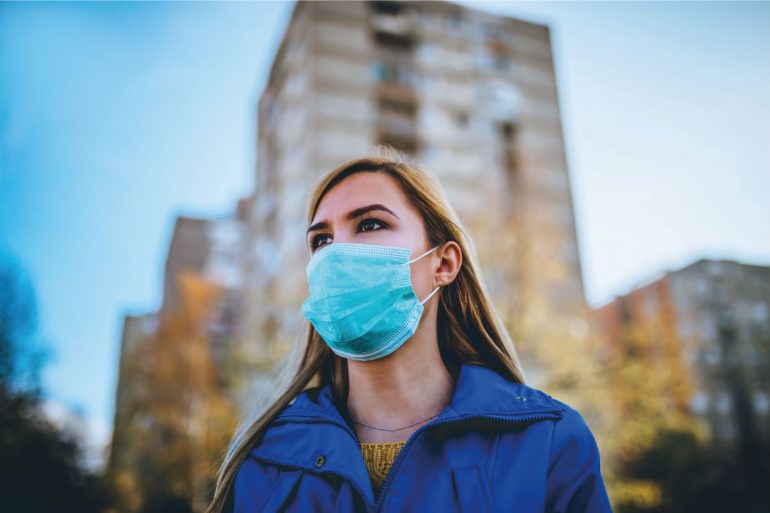One phenomenon that is observed in patients who have been diagnosed positive for coronavirus and for which there are not many answers yet is "longcovid".
These are patients who have been infected with the virus and who continue to show symptoms of the disease Covid-19 after weeks or even months.
The infectious disease specialist and member of the Epidemiological Team, Dr. Konstantinos Tsioutis explains what "longcovid" means, what we know so far about the phenomenon and what questions need to be answered.
"Longcovid is a condition that has been described in recent months mainly due to the increasing incidence worldwide and the growing clinical experience. There is no specific definition but we consider them to be people who have been infected with Covid-19 and which at least three weeks after diagnosis when they no longer transmit the virus but continue to have symptoms that can affect various organs and various functions of the body.
What are the symptoms of longcovid?
According to Dr. Chiouti The most common symptoms are:
Shortness of breath
Cough
reduction of oxygen due to fatigue
low pressure
arrhythmias
Ανορεξία
Fatigue
memory disorders
difficulty concentrating
Sleep Disorders
"Which may be related to an injury from the infection and is observed especially in people who needed hospitalization and hospitalization in the Intensive Care Unit", added Dr. Tsiotis.
He noted that several such cases have been described.
"The symptoms can last for months after the infection and it is understood how much the daily life of these people is affected and their functionality because they often need help at home, they can not return to work and we observe it even in young people. not only in the elderly who have passed this infection ".
Asked if there is a specific treatment for people diagnosed with Covid-19 and continue after weeks or even months to show some symptoms Dr. Tsiotis said,
"These patients, who have symptoms for at least three weeks after infection, need a comprehensive and individualized assessment, a good medical assessment and then what they need is a personalized approach, ie treatment or management of the symptoms they report and a good control to see in what condition they are. That is, some people may want a pulmonary evaluation, chest x-ray, cardiological examination, heart ultrasound, blood tests to see in what condition they are and how they can be treated.
He added that there are no specific instructions for treatment.
"The treatment they receive is pharmacological, it is symptomatic and many of them need respiratory or musculoskeletal physiotherapy to return to their normal state and function as soon as possible and need regular monitoring. It should be noted that many such clinics have been set up abroad or that people are treated in external clinics that are attended by these people. There are too many people affected by Covid-19 and this situation is observed. And that is where we are heading for this and we decided to set up such an outpatient clinic, a clinic of appreciation for these people ".
Asked if there is data on patients who continue to show symptoms of the disease after a period of time Covid-19 Dr. Tsiotis said,
"It is estimated that it is in 10-20% of patients who are affected but there is no clear database that gives us these numbers. In Cyprus we still do not know how many these people are, there is no registration system and that is where this initiative is.
What do we need to know about longcovid?
The questions that must be answered about the "longcovid" phenomenon, are according to Dr. Chiouti are the following,
"First of all, we want to understand what may be due, what is causing it. There are various theories and conjectures, one of which is that some underlying diseases get worse, that is, if someone already has a disease such as chronic asthma, chronic lung disease or heart disease, it certainly gets worse. But there are other mechanisms. It is probably due to immune mechanisms, ie the intense inflammation caused by the virus and that is why we see this post-infectious inflammation, ie the infection has passed, the person has got rid of the virus and has a residual inflammation that has affected some organs. That is why these people do not transmit. The other thing we want to see is the extent of the problem, ie what percentage of patients are affected and how long it lasts. We do not know that at all. "We see that some people need weeks or even months, but we do not know exactly how long it lasts and whether it leaves permanent residues, whether it leaves permanent health problems."
He also added that it is still early for estimates.
"I hope it does not leave permanent health problems but it is something that remains to be determined. Let me stress, however, that we see this after other infections, it has been observed for example after the flu, it was also characterized after Ebola, so we see it after serious infections and because we now have so many millions around the world that have been shown from Covid-19 we will see these situations, we will see "longcovid" more and more ".
Source: alphanews
